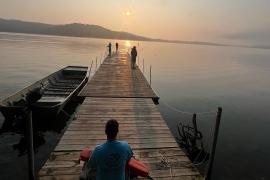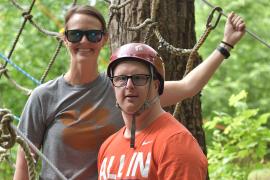As a camp director, when I say “culture,” I expect you may first think about camp songs and traditions. If you are looking to invite international camp counselors, I mean something different. In this blog, we will explore culture: what it means, various dimensions, and how this can show up at camps who employ international counselors.
So, what is “culture”? Every person you know lives and is defined by culture in some aspect; it’s human nature. Thus, everyone has their own opinion and perspective on what culture is to themselves or collectively, which ironically is an aspect of culture as well. My favorite definition is “The need to communicate information and the basis of how it’s done depending on the community.” My studies have led me to examine the works of anthropologists Edward T. Hall, Fons Trompenaar, and Geert Hofstede. Each of these researchers landed on their own structural definitions of culture, curated so it could be understood by people such as you and me. The beautiful thing about learning about culture is that no matter who you are, you can relate to it and see yourself reflected in its essence.
Here are some cultural dimensions we will be exploring.
- It is important to note that cultural dimensions are scaled. With most, I will be presenting the two extremes, and people can fall anywhere on that scale.
Context
Definition: Context refers to how much communication and information an individual can observe and utilize at any time. Communication includes body language, use of silence, implications of a message, or how much they know about their environment. We can observe high and low context in cultures:
- High context cultures can read and convey codes through verbal and body language. They can infer and understand messages without being explicitly told directly. Examples: Japan, China, Middle East, Mexico, Italy, Greece
- Low context cultures have communication codes that are not easily interpreted. This means they use their verbal communication as the primary form of communication and explanation. Examples: Germany, Switzerland, Nordic countries, Australia, The Netherlands, New Zealand, Israel, Eastern Europe
How this can show up at camp: When you have counselors who have never worked at a camp, you may have to be extra aware of the codes you are using in communicating tasks, expectations, your vision, etc. What may be obvious to you may not be to others. Some counselors, you may find, need everything spelled out to them every time. Others may pick things up quickly. This may not be related to that person’s intellect, but rather how much context they are used to receiving or absorbing. To be on the safe side, it is better to over explain rather than under explain.
Chronic Time
Definition: Chronic refers to time; the use and interpretation of it.
- Polychronic cultures are able to handle multiple activities and tasks at the same time. They often place a high value on building relationships, flexibility, and adaptability. Examples: Latin American countries, African countries, India, Philippines, Pacific Islander countries, Mediterranean countries
- Monochronic cultures tend to focus on one task at a time and can’t move on fully until it is complete. They tend to value punctuality, follow strict schedules, and focus on one task at a time. Examples: North American countries, Western European countries, Japan, UK, The Netherlands, Belgium, South Korea, Saudi Arabia, China, Switzerland, Australia.
How this can show up at camp: You may have heard of Island time or Latin time. This comes across as being leisurely with their time and unconcerned or focused on the schedule. Polychronic people have two main skills: multitasking and building/maintaining relationships. Typically, the relationship is more important than the clock. If a meeting is going over, it’s because the relationship is being built. They may be maintaining multiple conversations and tasks at the same time. A monochronic person may perceive this as a lack of focus, whereas the polychronic person has been culturally programmed to maintain many tabs open at once. One counselor may rush their campers to the next activity, while the other may be engaging in conversation with many campers at a time on the way to the destination, resulting in them being late. If one or the other is more important to you and your camp, you may need to explicitly state whether keeping to a schedule is important.
Space
Definition: How different cultures organize, perceive, and use space, and how these cultural variations influence human behavior, communication, and social interactions.
- Personal: Some cultures may have smaller personal space bubbles and are comfortable with close physical proximity during interactions, while others may prefer more distance. More personal space country examples: Scandinavian, North American, Germany, New Zealand, Australia, Japan, China
- Public/private: Some cultures may be more communal, with less distinction between public and private spheres, while others may have stronger boundaries and distinctions between these spaces. Less personal space country examples: Latin America, Italy, Greece, Spain, India, Pacific Islander, Philippines, Thailand, Indonesia
How this can show up at camp: Considering your counselors will be inhabiting close quarters with strangers, cultural tensions may arise. We all have our own individual space bubbles (called proxemics) that vary in circumference depending on your relationship with what is in your proximity. You may find that one counselor has a tendency to stand a little too close to hug and hang off of others.
Power Distance
Definition: How a culture perceives and responds to hierarchical structures and authority figures.
- High power distance cultures are accepting and expecting hierarchical order, and people tend to acknowledge and respect authority. Communication tends to be more formal and centralized. Examples: China, Japan, South Korea, Mexico, Brazil, Russia, India, Greece, Italy, Spain
- Low power distance cultures share a preference for more equality in the distribution of power. Communication tends to be more informal and collaborative. Country Examples: Sweden, Norway, Denmark, Finland, The Netherlands, Germany, Switzerland, US, Canada, Australia, New Zealand, Singapore, Italy, Poland, Czech Republic
How this can show up a camp: This dimension will become obvious once you start to see it. You will have counselors who may have issues but fail to bring it up to anyone of authority, while others feel comfortable doing so. Some will use terms like “sir” or “ma’am” and others will call you by your first name. We know that camp is family style, and the directors are accessible and friendly. But to many, this is employment, and hierarchy rules. It can be critical to have levels of American staff between management and counselor staff so that counselors from high power distance cultures find a person with whom they feel comfortable communicating.
Individualism versus Collectivism
Definition: The degree to which individuals in a society are integrated into groups and the extent to which they prioritize individual or collective goals.
- Individualistic cultures tend to see themselves as independent and autonomous, valuing personal freedom, self-expression, and individual accomplishment. They do not on social hierarchy. Examples: US, Canada, Sweden, Norway, Denmark, Finland, The Netherlands, Germany, Australia, New Zealand, Japan, South Korea, Argentina, Uruguay, Chile, Poland, Czech Republic, Singapore
- Collectivistic cultures focus on the group, such as the family, community, or organization, and individuals are expected to prioritize the goals of the group over personal goals. Rely on social hierarchy. Examples: China, Japan, South Korea, Vietnam, Thailand, Indonesia, Philippines, India, Pakistan, Mexico, Brazil, Colombia, Russia, Ukraine, Bulgaria
How this can show up at camp: An individualistic counselor will expect and provide direct and assertive communication, with an emphasis on expressing personal opinions and ideas. On the other hand, a collectivistic counselor will prioritize group harmony, despite their personal needs not being met.
Uncertainty Avoidance
Definition: Reflects how a culture deals with ambiguity, unpredictability, and the unknown.
- Avoidant: Strong desire for rules, structure, and clear guidelines. They may be uncomfortable with ambiguity and a low tolerance for risk. Examples: Japan, South Korea, Mexico, Brazil, Greece, Italy, Spain, Russia, Ukraine, Germany, Sweden, Norway, Denmark, Finland, Switzerland, Austria
- Un-avoidant: Will be more comfortable with unpredictability. They will prefer flexibility and adaptability and a higher tolerance for risk. Examples: Sweden, Norway, Denmark, The Netherlands, France, US, Canada, UK, Australia, New Zealand, Singapore, Portugal, Spain, Colombia, Argentina, South Africa
How this shows up at camp: Some counselors may want to try new things, learn new skills, and provide innovative suggestions. Others may want to stick to what they know and being pushed into new situations or environments may cause stress and anxiety. Notably, those who come from avoidant cultures such as Japan and Germany may already be overcoming a great deal of anxiety taking on this adventure. Providing structure and going into great detail about new activities will help them adapt better.
A few aspects that are not defined dimensions but are noteworthy:
Food and Meals
Your international counselors are likely going to be eating nearly every meal with the camp. What is eaten and when will vary camp to camp. Take sandwiches for example — if you’ve hired a Dutch counselor, they eat sandwiches almost every day. Bread is a big part of their diet. For another culture, such as Filipino, rice is a staple in almost every meal. Eating bread so often and less rice can cause a strain on them and their habits. Understanding that eating habits in relation to meal times and the contents of meals can significantly impact someone’s experience at camp.
Suggestion: Take a look at dominant cultures at your camp and make adjustments based on feedback from those counselors. For example, one camp added “rice night” at least once a week, where the kitchen prepared three different types of rice dishes.
Discipline (As it relates to counselors/campers)
It is hard to know what sort of tools any person is equipped with when they come to camp. Culturally, discipline will be different! What one person may see as acceptable, another may not. It’s very important your staff are taught appropriate forms of conflict resolution/discipline based on your expectations at camp. A counselor may enact a form of discipline they know themselves, but would be perceived poorly to the American eye, unbeknownst to them. Even an act as small as a raised voice could be perceived as aggressive, in which the “shouter” is not aggressive, they just talk loudly.
Suggestion: Ensure that thorough training is provided on camp expectations. If something does come up, take a look at it through a cultural lens first. Talk to that staff member about their actions and try to understand where they are coming from. Once you understand, you can provide feedback that they can apply.
Arrival and Time Zone
If you are lucky, you may have a counselor joining you from all the way from the other side of the world. That will be a big adjustment for them. Not only do they need to adjust to the time zone, but they will likely be tired the first few days of training due to jet lag. Over the course of the summer, take into account that these staff members have friends and family located in different time zones. They may want and need to spend time at odd hours to connect with them. Allowing time and grace for this may help that person manage homesickness.
Suggestion: If possible, allow the counselor to arrive a day or two prior to training. This will give them a chance to acclimate a bit before they are rushed into training. Let them check in with their family upon their arrival.
Feedback
At the end of each summer, Odyssey asks our participants to provide feedback on their program. One question is as follows: “What aspect of American culture did you find to be the most different from your home country's culture? What did you find to be the most similar?” Looking at the responses from their eyes is very interesting because it is what stood out to them in relation to themselves, their own worldview. From this we can see our own culture showcased.
- “Americans — and not just them, but most of the international staff — were always punctual at every task assigned.”
- “The work. It was definitely hard to time a moment to rest and they were all about being working the whole time no matter how tired we were.”
- “The most distinct aspect of American culture, in comparison to my Mexican background, is the emphasis on individualism. In the US, personal freedom and self-expression are highly valued, which contrasts with Mexico's stronger emphasis on community and family ties. On the other hand, the dedication to hard work and pursuit of opportunities resonates with both cultures. The shared value of hospitality and friendliness in both societies also created a sense of familiarity, making my J-1 Visa experience rich and insightful.”
- “I found out that the people that I spoke in America are welcoming and nice. It was a different feeling from home.”
- “Everybody says I love you all the time. We don't have that in Jamaica. And I really got accustomed to it. To the point where I even started saying it.”
- “American culture tends to be more informal than my country. It’s common for Americans to wear casual clothing to school and isn’t uncommon to call supervisors by their first name. But good manners and politeness are always appropriate as in my country.”
- “Food definitely. That's really different. And the habits change a lot.”
This is a lot of information to take in! That’s OK; digest it, save it, read it again, share it, discuss it. This is important to grasp if you have international counselors. They will be facing these challenges every day, whereas you are in your environment. International counselors will have a different set of challenges compared to domestic staff. The struggles and challenges will be unique to them. The first three to four weeks will be tough as they transition from arrival, to training, to working with campers. Allowing space to listen to them about their experience and letting them know that these challenges are normal and okay, will make a world of difference in their experience with your camp.
This blog was written on behalf of Project Real Job whose purpose is to support camps in their efforts to recruit, hire, and retain staff.
Kelsy Melton is the J-1 camp counselor program manager at Odyssey International, a J-1 Visa Sponsor. Kelsy has lived in three foreign countries and earned her MBA in France in which cultural intelligence was a pillar of the program. Kelsy has spent two summers in managerial roles with Embassy Summer, an ESL and cultural immersion camp, and maintains a close relationship with the camp.
Photo courtesy of Wanakee in Meredith, NH
The views and opinions expressed by contributors are their own and do not necessarily reflect the views of the American Camp Association or ACA employees.




